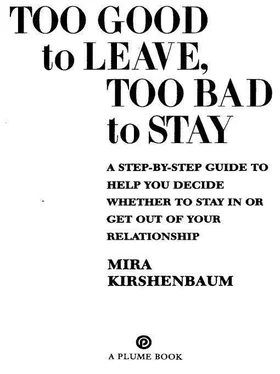Kirshenbaum, Mira - Too Good to Leave, Too Bad to Stay
Здесь есть возможность читать онлайн «Kirshenbaum, Mira - Too Good to Leave, Too Bad to Stay» весь текст электронной книги совершенно бесплатно (целиком полную версию без сокращений). В некоторых случаях можно слушать аудио, скачать через торрент в формате fb2 и присутствует краткое содержание. Жанр: Психология. Описание произведения, (предисловие) а так же отзывы посетителей доступны на портале библиотеки ЛибКат.
- Название:Too Good to Leave, Too Bad to Stay
- Автор:
- Жанр:
- Год:неизвестен
- ISBN:нет данных
- Рейтинг книги:3 / 5. Голосов: 1
-
Избранное:Добавить в избранное
- Отзывы:
-
Ваша оценка:
- 60
- 1
- 2
- 3
- 4
- 5
Too Good to Leave, Too Bad to Stay: краткое содержание, описание и аннотация
Предлагаем к чтению аннотацию, описание, краткое содержание или предисловие (зависит от того, что написал сам автор книги «Too Good to Leave, Too Bad to Stay»). Если вы не нашли необходимую информацию о книге — напишите в комментариях, мы постараемся отыскать её.
Too Good to Leave, Too Bad to Stay — читать онлайн бесплатно полную книгу (весь текст) целиком
Ниже представлен текст книги, разбитый по страницам. Система сохранения места последней прочитанной страницы, позволяет с удобством читать онлайн бесплатно книгу «Too Good to Leave, Too Bad to Stay», без необходимости каждый раз заново искать на чём Вы остановились. Поставьте закладку, и сможете в любой момент перейти на страницу, на которой закончили чтение.
Интервал:
Закладка:
A woman once asked me about this. “I slept with a guy at work. It’s over now, but my problem is that I feel so guilty and mad at myself that I can’t get beyond those feelings and that makes me wonder if it isn’t too late for me.”
My answer is this: you have to treat feelings carefully. They’re real and important but they can also be complicated and misleading. If your relationship is really over, you’ll find that out through answering this series of questions. But having had an affair can make you feel guilty, grief-stricken, fearful, enraged, self-satisfied, empowered, and a lot of other emotions that can lead you to think you’ve done something to end the relationship when you really haven’t. You’ve only done something to end the relationship when you’ve done something that actually ends the relationship. In and of itself an affair is not necessarily that.
PERSPECTIVES: HOW TO GET OVER THE LOSS OF LOVE
The theme right now is your facing up to the possibility that the relationship is already over, that it’s just been hard for you to face the fact that you’ve decided it’s best to leave.
Why would you be so blind?
It’s hard to give up on love, to say good-bye to love, to move into a future where for sure you don’t have the love you used to have. After all, even in the worst of relationships there’s a little love left somewhere. And for people in relationship ambivalence there’s usually more than just a little love left. Leaving means saying good-bye to this love, and that’s very scary for a lot of people.
This is particularly an issue for women. In one area of life after another, from love to money, women are often more motivated by fear of loss than men are, less willing to take risks. When offered the choice between the bird in the hand and two in the bush, more women than men will choose the bird in the hand and more men than women will go for one of the birds in the bush.
I don’t want to overemphasize the difference. There’s no huge polarity. It’s not that all men love risk and all women hate risk. But when it comes to staying in a bad relationship more women are motivated by fear of loss and loneliness than men.
The last thing someone in your situation wants is empty reassurances. So I won’t tell you that if you’ve found someone once you can find someone again; and if you’ve loved someone once you can love someone again; and the more love you have to give, the more likely you are to find someone.
Instead, let me tell you what most people in your situation say when they’ve left a relationship that was clearly too bad to stay in: over and over, they say they feel relief and hope, supported by a newfound sense of self-respect and self-reliance.
Women particularly say they’re surprised at how much they like living on their own, able to do what they want when they want. They’d like to fall in love but almost never are they willing to settle again for the kind of relationship they left.
What’s their advice to you? Don’t worry, they say. If you made your choice in a responsible way, you will get over the loss of a particular partner. In the meantime, the keys to happiness are doing things you care about and staying connected to people.
STEP #4: “IF IT WERE UP TO GOD ...”
Some people have already decided to leave their relationship even though they’ve taken no action to get out. The obstacle for them isn’t acknowledging something practical, it’s acknowledging something emotional.
What’s missing for them is a sense of permission. They might feel guilty about leaving a partner who needs them. They might feel publicly shamed if this relationship can’t work. They might feel worried about what leaving will do to their children. They might dread the sense of failure that’ll come with ending the relationship, perhaps because other relationships have failed. They might be unwilling to acknowledge the death of love. They might be feeling all of these and more in some unique combination I’ve never seen before. Every part of them knows it’ll be best to leave—they just need permission before they can see their truth.
Michael’s Story
Lots of people have shed tears in my consulting room, but I never saw a flood of tears like the one poured forth by Michael, a locally prominent couples therapist, who’d come to me for help. After I worked with him for a bit I started to smell a rat. This talented, knowledgeable, highly motivated guy shouldn’t have had such a tough time seeing what was going on in a relationship so clearly filled with terrible problems.
So I asked Michael what I’ll ask you:
Diagnostic question #4. If God or some omniscient being said it was okay to leave, would you feel tremendously relieved and have a strong sense that finally you could end your relationship?
That’s when his tears flooded forth.
We’ve all seen films about wild chimpanzees in which there’s the heartbreaking scene of a mother chimp carrying around the corpse of her dead baby for hours, even days. That’s what it had been like for Michael: he’d been carrying around the corpse of a dead relationship for a long time for the simple reason that he couldn’t give himself permission to acknowledge that it was over. He sobbed in sudden mourning for a loss he’d been living with for a long time.
Why was it so hard for him to give himself permission? Partly it was because he was a therapist: if his relationship was over, didn’t that mean he was a fraud and a failure? And lots of non-professionals have the same feeling, too. Women feel it because we believe that making a relationship work is ultimately our job, our skill, our talent even. But men feel it as well.
There were other reasons why it was hard for Michael to give himself permission to leave. Most important was the sense he’d had that if he really were a good person he’d stay and work harder at it. Only a bad person, he thought, would walk out on a partner and all the hopes they’d had for the future, to say nothing of what this would do to their children.
This “I don’t want to be a bad person” factor is often overlooked these days because so much emphasis is placed on our sense that there are too many divorces. Perhaps there are too many. But for every divorce brought about by people who should feel more responsible to themselves and their partners, there’s a relationship not ending because someone feels too responsible.
Let’s deal with question #4 itself. Here’s the guideline:
GUIDELINE #4
Imagine how you’d feel if God or some omniscient being said you had permission to leave your relationship if you wanted to. If this suddenly gives you a strong sense that it’s all right for you to end your relationship, you’ll most likely feel you’ve discovered what’s best for you if you choose to leave. Quick take: If God’s saying “Hey, whatever you want is okay with me” is all you’d need to feel it’s okay to leave, it’s okay to leave.
Your answer here is only meaningful if a clear, definite yes came through without hesitation or confusion. If you have to stop to analyze your feelings to see if your answer is yes, it’s not yes.
You won’t need such an overwhelmingly resounding yes to count as an answer to other questions, but you do here. If the sense of total relief at the thought of getting total permission to leave doesn’t immediately clarify the fact that you’ve already decided to leave, you need different kinds of information to get you out of relationship ambivalence. You’ll get that information later, but you haven’t gotten it yet.
My World Is Empty Without You, Babe
Every once in a while someone has an unusual response to question #4. Instead of feeling either tremendously relieved or not feeling anything strongly one way or the other, they’re astonished to find they feel dismayed or indignant. They feel a kind of loud No! rise up in them. They discover that they very much do not want to hear that it’s okay to leave. They’re aching for some sign that there are buried treasures in the relationship that make it too good to leave.
Читать дальшеИнтервал:
Закладка:
Похожие книги на «Too Good to Leave, Too Bad to Stay»
Представляем Вашему вниманию похожие книги на «Too Good to Leave, Too Bad to Stay» списком для выбора. Мы отобрали схожую по названию и смыслу литературу в надежде предоставить читателям больше вариантов отыскать новые, интересные, ещё непрочитанные произведения.
Обсуждение, отзывы о книге «Too Good to Leave, Too Bad to Stay» и просто собственные мнения читателей. Оставьте ваши комментарии, напишите, что Вы думаете о произведении, его смысле или главных героях. Укажите что конкретно понравилось, а что нет, и почему Вы так считаете.












